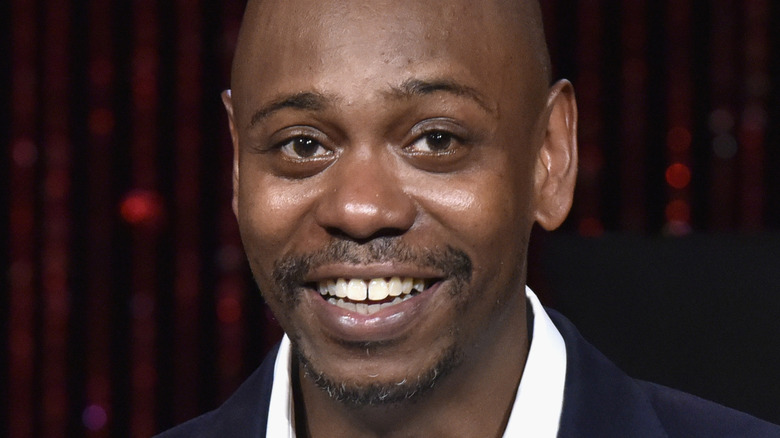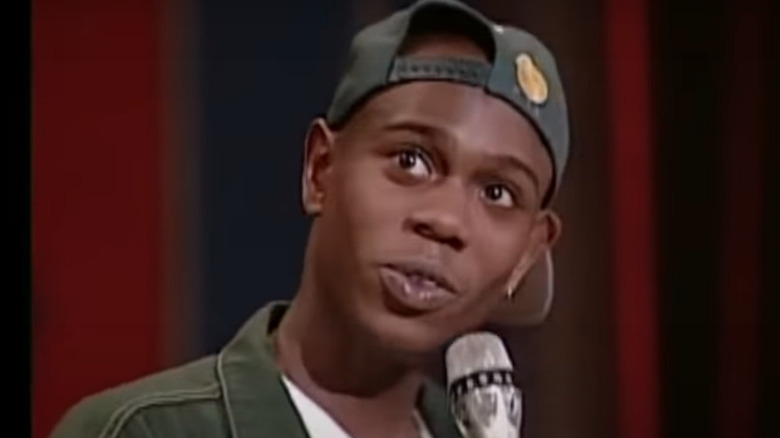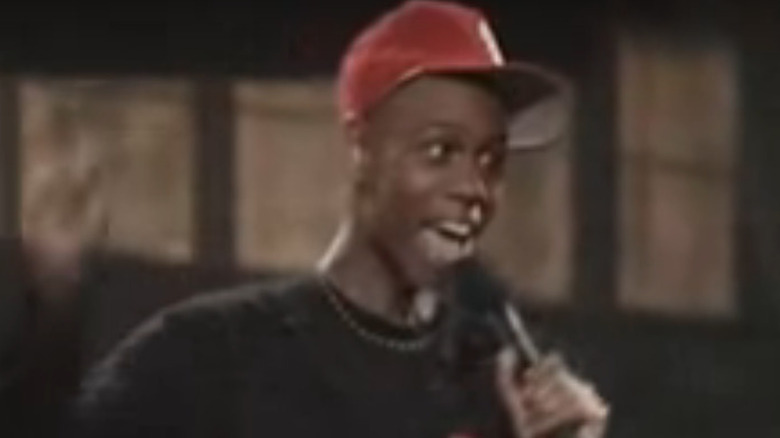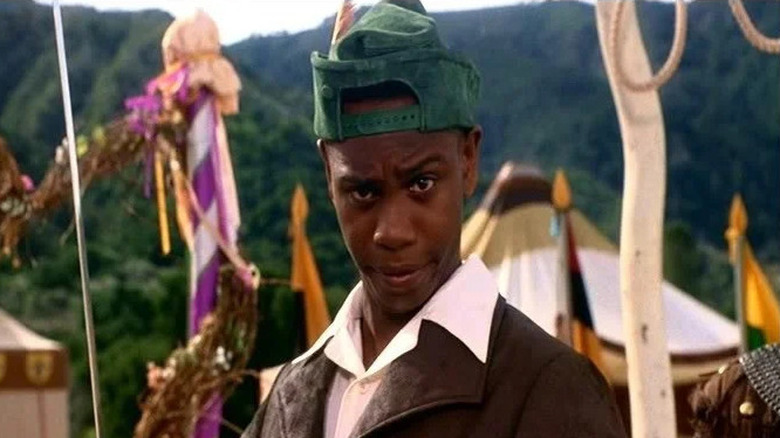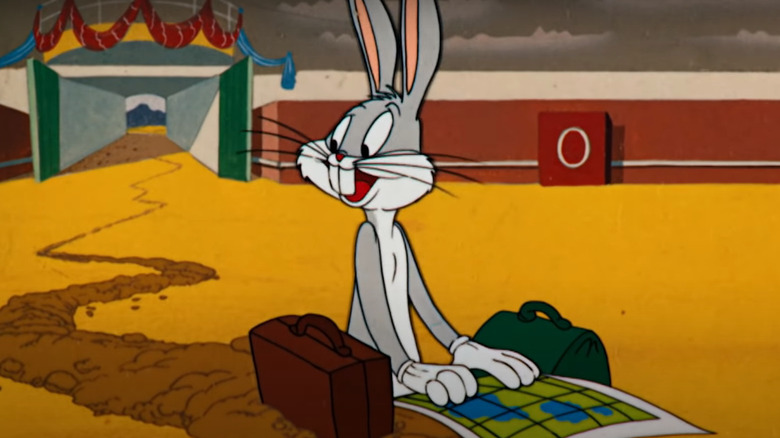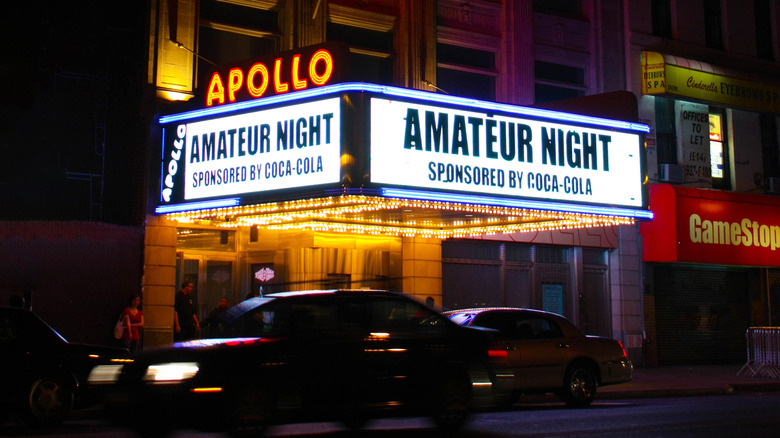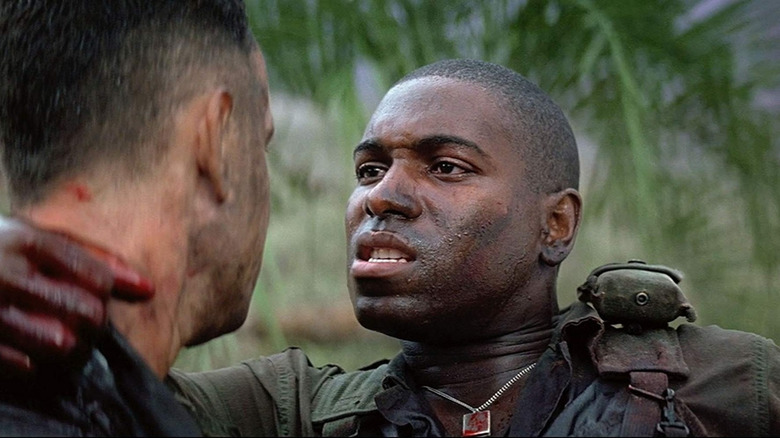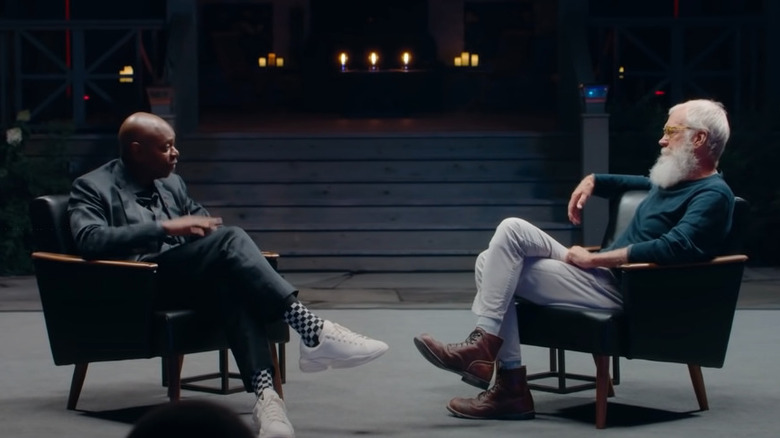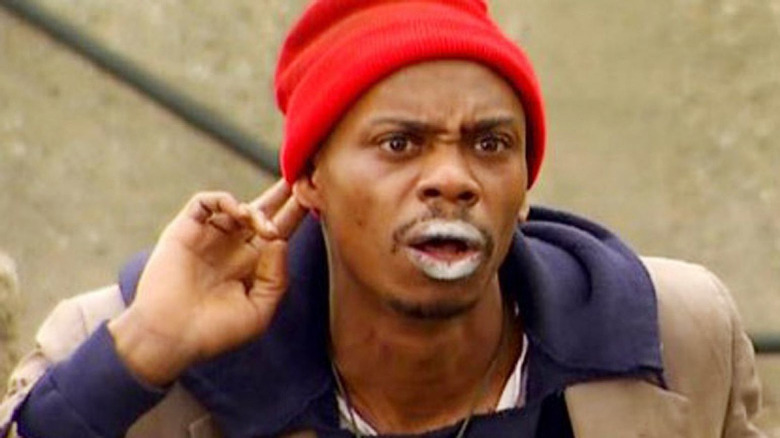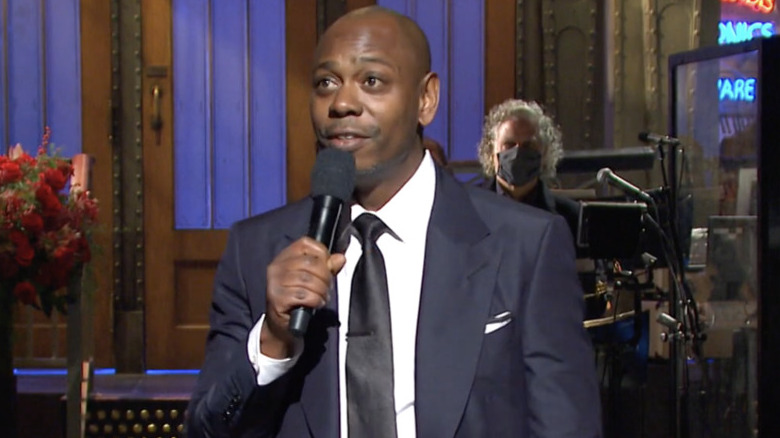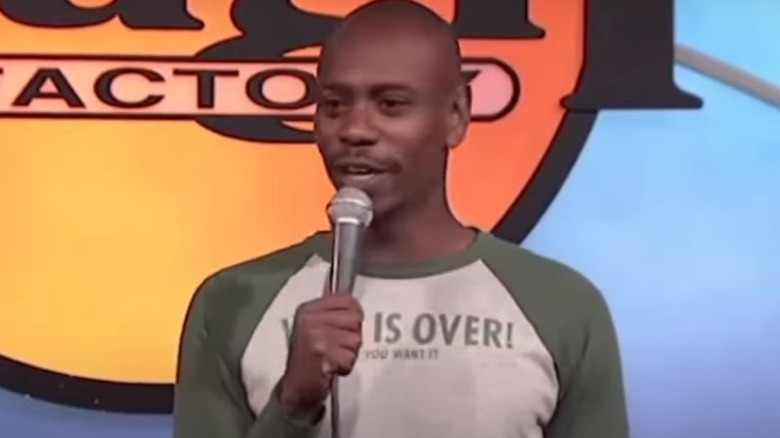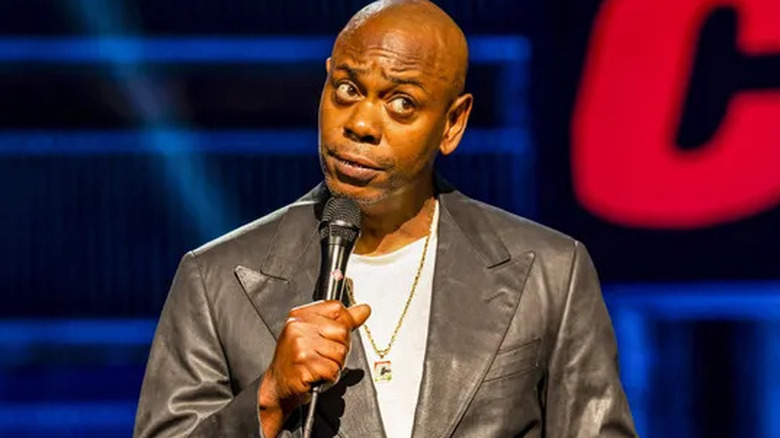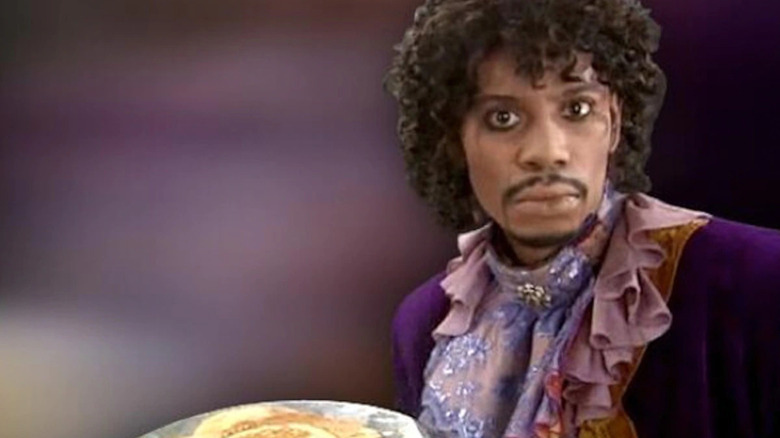Dave Chappelle Facts That Are Nothing To Joke About
If anyone knows how to make an audience laugh, it's Dave Chappelle. His uniquely bold style of comedy has earned him tons of awards, including the prestigious Mark Twain Prize for American Humor in 2019, more than 30 nominations for his work in TV and film, and five Emmys.
His jokes have led to some criticism over the years since he doesn't shy away from controversial topics like politics and race, but he doesn't let that stop him from having a good time. Well, he did abruptly quit his massively popular series "Chappelle's Show" during the height of its success and take off to Africa, but that was only one time.
Chappelle has spent a lot of time in the spotlight, but there are still many things that fans may not know about him. Discover these little-known facts about his early career, comedic influences, and more.
He decided he wanted to be a comedian when he was 14 years old
We'd wager that most 14-year-olds have no clue what they want to do with their lives, but that was the age Chappelle realized he wanted to become a comedian. He saw Bill Cosby on "The Cosby Show" and was so inspired that he decided to start writing jokes of his own. While attending the Duke Ellington School of the Arts in Washington, D.C., he studied theatre arts and began performing stand-up comedy in the area. His mom would often have to accompany him to clubs and bars since he was underage at the time.
After graduating from high school in 1991, he decided not to attend college so he could move to New York City and pursue a comedy career full time. Within months, he was performing in comedy clubs all over the city. He quickly made a name for himself as people noticed his great sense of humor, personality, and charisma. It wouldn't be long before he took his career to the next level by appearing in TV shows and movies.
His first major TV appearance was on Def Comedy Jam
Chappelle made his first major TV appearance on Russell Simmons' "Def Comedy Jam" in 1992. Each episode showcased talented new comedians, and viewers thought Chappelle was absolutely hilarious. The show exposed him to a much wider audience and helped him land more opportunities to be on TV.
In 1995, he appeared in an episode of "Home Improvement" as a member of the "Tool Time" audience. He didn't have much time on screen, but TV executives were so impressed that they gave him a leading role in the spin-off series "Buddies." The show centered around two friends trying to run a video production company. Unfortunately for Chappelle, the show was a flop and got canceled after only five episodes. The show may have been short-lived, but Chappelle's comedy career was just getting started. He went on to appear in many more shows and movies before eventually starting the immensely popular "Chappelle's Show" in 2003.
During an interview with Project Casting in 2021, Chappelle said, "I love television. The fact that television ultimately made me famous was very gratifying for me."
He made his film debut in Robin Hood: Men in Tights
In 1993, shortly after his first TV appearance, Chappelle put on a pair of tights and took his career to a whole new level. He made his film debut as Ahchoo in "Robin Hood: Men in Tights." It was far from a serious role, but higher-ups could already tell they had a star on their hands. Chappelle's career kept gaining momentum as he landed supporting roles in several other movies, such as Ozzie in "Undercover Blues," Reggie in "The Nutty Professor," and Pinball in "Con Air."
In 1998, he co-wrote, produced, and starred in the stoner comedy "Half Baked." He played Thurgood Jenkins, a stoner who starts selling weed with his friends to raise enough money to bail their buddy out of jail. Although the movie has become a cult classic, it actually had terrible reviews when it was first released. Neal Brennan, who co-wrote the film with Chappelle, said that it initially had a negative impact on both of their careers because Hollywood executives didn't take them seriously. They drifted apart for a while. Then, several years later, the pair co-wrote "Chappelle's Show," which became Comedy Central's top-rated program in 2005 and launched Chappelle to stardom.
His comedic influences include Richard Pryor, Eddie Murphy, and Bugs Bunny
Chappelle has a pretty eclectic group of comedic influences. He's heavily inspired by Richard Pryor, which makes a lot of sense as Pryor would often joke about race. Chappelle is inspired by Eddie Murphy as well, having previously said that Murphy was "a huge part of the reason" that he started doing comedy in the first place.
But his biggest comedic influence might be the "Looney Tunes" character Bugs Bunny. According to Showbiz Cheatsheet, Chappelle said, "It's weird. If you watch a lot of the stuff I do, you can almost see the influence in it." He went on to say that the voice actor for Bugs Bunny "was like some kind of savant or genius or something. But that had some kind of real big comedic influence on me. Like, I like those cartoons. I think that was my first real big comedy influence, a rabbit."
Now that you know Bugs Bunny influenced Chappelle's style of comedy, good luck unseeing it next time you watch him perform.
He was once booed off stage during Amateur Night at the Apollo Theater
It's hard to believe that such a hilarious comedian could get booed off stage, but Chappelle has always had a controversial style of comedy, and his jokes don't sit right with every audience. Shortly after he'd moved to New York City to pursue his dream of becoming a comedian, he got the chance to perform during Amateur Night at the famous Apollo Theater in Harlem. This was a big opportunity to show off his comedic potential, so he tried his best to impress the audience, but they weren't having it. His jokes weren't landing and he ended up bombing so hard that he was booed off stage — in front of his friends and family, no less.
Chappelle later said the incident actually encouraged him to continue in show business. "That night was liberating because I failed so far beyond my wildest nightmares of failing," he said during an interview with James Lipton. Surprisingly though, he said it wasn't that bad, and after that experience, he was "fearless."
He turned down the role of Bubba in Forrest Gump
"Forrest Gump" was such a great movie that you'd think any actor would jump at the opportunity to be in it, but Chappelle was offered the role of Bubba and turned it down. Chappelle wasn't interested in the role because he thought it perpetuated demeaning stereotypes about Black men. In the movie, Bubba had a learning disability but was slightly more intelligent than Forrest. However, Chappelle claims he read an earlier version of the script in which Bubba was even more dim-witted than Forrest, which didn't appeal to him.
"That must not be the script I read. The hero is retarded. I don't know about you, but I don't have any retarded heroes," Chappelle said during a stand-up special featured in a Comedy Hype video. "Who could be dumber than Forrest Gump? His best friend, that's who. No matter how dumb a white dude is, they'll always find a n**** that's dumber than him."
Chappelle later regretted turning down the role since the movie was so successful. In 1997, he made a short parody of the film called "Bowl of Pork," starring as an unintelligent man who realizes that "life is just a bowl of pork."
He converted to Islam when he was a teenager
Chappelle's religious awakening all started at a pizza shop in Washington, D.C. Although the comedian stays quiet about his religious beliefs for the most part, faith is a big part of his life.
"I wanted to have a meaningful life, a spiritual life, not just what my hands can hold. I felt like I've always had this notion that life should mean something," he said during an interview with David Letterman in 2020.
When he was 17 years old, he would go to a local pizza shop where a lot of Muslim people worked. He was struck by how positive they all seemed, prompting him to ask them about their beliefs. "I would ask [the owner] questions about his religion and the guy was so passionate about it. It was very compelling. I liked the perspective of it."
That led Chappelle to convert to Islam when he was a teenager, and he hasn't looked back since. He says that being a Muslim has given his life and career more meaning — so why doesn't he talk about it more often?
"I don't normally talk about my religion publicly because I don't want people to associate me and my flaws with this beautiful thing," he said during a 2005 interview with Time magazine.
He left Chappelle's Show abruptly in 2005 because he was unhappy with the direction it was going
To this day, "Chappelle's Show" is one of Chappelle's most memorable projects — and for good reason. He wasn't afraid to take on big issues like race and social stereotypes in the groundbreaking sketch comedy series. It was a huge hit, and at one point, Comedy Central offered him $50 million to keep making it. Instead, in 2005, Chappelle shocked everyone when he abruptly left the show during production of the third season, bringing it to a screeching halt.
Chappelle had been filming a skit about pixies that embodied different races. He liked the skit, but a crew member laughed at a moment that made him wonder if he was reinforcing racial stereotypes rather than making fun of them.
"The sketch wasn't that bad. It's actually funny. It was a pixie. It was me dressed in blackface who'd pop up anytime a person felt the pains of racism, which is a tough trick to pull off. It's not a bad sketch, but hearing the wrong laugh, while you're dressed that way, it makes you feel shame," Chappelle told David Letterman during an interview in 2020.
He said that wasn't the only reason he left, but it did influence his decision. He had already been feeling overwhelmed, pressured by the network, and unhappy with the direction the show was going. The incident was just the straw that broke the camel's back.
After leaving Chappelle's Show, he became reclusive for years
After leaving the show, Chappelle took things a step further and left the entire country. He visited South Africa for a while, and when he returned to the United States, he started living a more reclusive lifestyle. He stepped away from the spotlight, moved to Yellow Springs, Ohio, and made much fewer public appearances than before. He did release the documentary "Dave Chappelle's Block Party" in 2006, but other than that, he mostly kept to himself.
In 2013, fans were happily surprised to see Chappelle at The Comedy Cellar in New York City. Comedian Chris Rock joined him on stage and the two talked about possibly touring together. Shortly afterward, Chappelle made a formal return to stand-up comedy and started touring the country. Did he miss his fans or did he just need more money? Fans didn't know, and they didn't really care because the bottom line was Chappelle was back! They welcomed him with open arms and he went on to appear in many more movies and shows, including "A Star Is Born" and "Saturday Night Live." In 2016, he also reportedly signed a deal with streaming giant Netflix, earning $60 million in return for three comedy specials.
He held the Laugh Factory endurance record until Dane Cook broke it in 2015
The Laugh Factory has an endurance record for the comedian who can perform stand-up for the longest amount of time. Richard Pryor set the record by performing for two hours and 40 minutes back in 1980, then Dane Cook set a new record for three hours and 50 minutes in 2009. Not long afterward, Chappelle broke that record with a performance lasting six hours and seven minutes. Later that year, he topped his own record by cracking jokes for six hours and 12 minutes.
Jamie Masada, the owner of the comedy club, told HuffPost that Chappelle "was determined to keep his record because he recently heard that Dane Cook was planning on trying to break [his] record."
Less than a month later, Cook took the stage again and set a new record by telling jokes for a whopping 7 hours. The set went on for so long that he sent out food to keep the audience happy.
"If this rivalry keeps up, I'm going to turn the Laugh Factory into a bed and breakfast," Masada said (via Fox News).
The LGBTQ+ community has accused him of being transphobic
Salt and pepper, peanut butter and jelly, Dave Chappelle and controversy — some things just go together. Throughout his entire career, Chappelle has faced controversy for pushing the limits of comedy. It has contributed to his massive success, but it has also gotten him in hot water, especially with the LGBTQ+ community.
They criticized him for being transphobic in his 2021 Netflix special "The Closer." He spent a lot of time joking about transgender people, stating that "gender is a fact" and that he's "team TERF," meaning he sides with trans-exclusionary radical feminists who reject the idea that trans women are women. After the special was released, things got so heated that a group of Netflix employees staged a walkout at headquarters to advocate for transgender rights. Netflix stood by Chappelle and said they would not censor artists.
As for Chappelle, he doubled down on his beliefs towards transgender people in his 2022 special "What's in a Name?" He addressed the backlash he faced, saying, "The more you say I can't say something, the more urgent it is for me to say it. And it has nothing to do with what you're saying I can't say. It has everything to do with my right, my freedom, of artistic expression. That is valuable to me." (via TV Insider)
Prince put a photo of Chappelle impersonating him on the cover of Breakfast Can Wait
Nothing was off limits in "Chappelle's Show," so the comedian once poked fun at Prince in one of the sketches. He impersonated Prince and destroyed Charlie Murphy at a game of basketball, all while looking absolutely fabulous. Prince responded by putting a photo of Chappelle impersonating him on the cover of his 2013 single "Breakfast Can Wait." In the photo, Chappelle is wearing an elaborately ruffled blouse a la the artist's "Purple Rain" era and holding a plate of pancakes.
"That's a Prince judo move right there," Chappelle said during an interview with Jimmy Fallon in 2014. "You make fun of Prince in a sketch and he'll just use you in his album cover. What am I going to do — sue him for using a picture of me dressed up like him? ... That's checkmate right there."
Chappelle is known for his sense of humor, but in this case, it looks like Prince got the last laugh.
